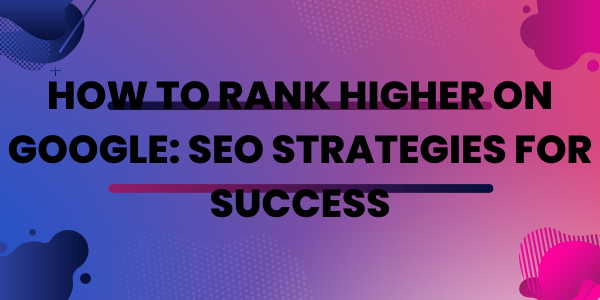Ranking higher on Google is essential for driving organic traffic to your website. With millions of searches happening every day, appearing on the first page of search results can significantly boost visibility and credibility. To achieve this, you need a strong SEO (Search Engine Optimization) strategy that aligns with Google’s ranking factors.
Why Ranking on Google Matters
Increases Website Traffic: Higher rankings lead to more organic visitors.
Builds Trust and Authority: Users trust websites that appear on the first page.
Boosts Business Growth: More visibility means higher conversion rates.
Cost-Effective Marketing: Unlike paid ads, organic traffic is free and sustainable.
Key Factors That Affect Google Rankings
1. High-Quality Content
Create informative, engaging, and valuable content that answers user queries.
Use relevant keywords naturally within the content.
Keep content updated and fresh to maintain relevance.
2. Keyword Optimization
Perform keyword research using tools like Google Keyword Planner and Ahrefs.
Target long-tail keywords for better search intent matching.
Optimize title tags, meta descriptions, and headers with keywords.
3. On-Page SEO
Use proper heading structures (H1, H2, H3) for readability.
Optimize images with descriptive alt tags and compress them for faster loading.
Implement internal linking to connect related pages and improve site navigation.
4. Technical SEO
Improve website speed by optimizing images and using caching techniques.
Ensure mobile-friendliness, as Google prioritizes mobile-first indexing.
Use structured data (schema markup) to enhance search results.
5. Backlink Building (Off-Page SEO)
Acquire high-quality backlinks from authoritative websites.
Guest post on industry-related blogs to gain credibility and backlinks.
Avoid spammy or low-quality links that can harm rankings.
6. User Experience (UX) and Engagement
Reduce bounce rates by improving page load speed and readability.
Create a clear website structure for easy navigation.
Encourage user interaction through comments, shares, and social engagement.
7. Local SEO (For Local Businesses)
Optimize Google My Business profile with accurate details.
Encourage customer reviews to improve trust and visibility.
Use local keywords and citations to rank in location-based searches.
Best Practices to Maintain a High Ranking
Monitor SEO Performance: Use tools like Google Analytics and Search Console to track rankings and traffic.
Update Content Regularly: Refresh old blog posts and pages with new information.
Follow Google Algorithm Updates: Stay informed about changes to ranking factors.
Avoid Black Hat SEO: Practices like keyword stuffing and buying backlinks can lead to penalties.
Conclusion
Ranking on Google requires a combination of quality content, technical optimization, and strategic SEO practices. By consistently following these techniques, businesses and website owners can improve their search engine rankings, drive more organic traffic, and achieve long-term success in the digital space. SEO is a continuous process, so keep optimizing and adapting to stay ahead in search results.


.png)
Comments
Post a Comment